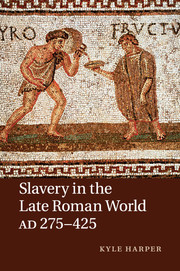Book contents
- Frontmatter
- Contents
- List of tables
- Acknowledgments
- PART I THE ECONOMY OF SLAVERY
- PART II THE MAKING OF HONORABLE SOCIETY
- Introduction
- 5 Semper timere: the aims and techniques of domination
- 6 Self, family, and community among slaves
- 7 Sex, status, and social reproduction
- 8 Mastery and the making of honor
- PART III THE IMPERIAL ORDER
- CONCLUSION
- APPENDIXES
- Bibliography
- Index
6 - Self, family, and community among slaves
Published online by Cambridge University Press: 05 August 2011
- Frontmatter
- Contents
- List of tables
- Acknowledgments
- PART I THE ECONOMY OF SLAVERY
- PART II THE MAKING OF HONORABLE SOCIETY
- Introduction
- 5 Semper timere: the aims and techniques of domination
- 6 Self, family, and community among slaves
- 7 Sex, status, and social reproduction
- 8 Mastery and the making of honor
- PART III THE IMPERIAL ORDER
- CONCLUSION
- APPENDIXES
- Bibliography
- Index
Summary
FROM THE SLAVE'S PERSPECTIVE
The only extant comedy from late antiquity is a Latin play composed in early fifth-century Gaul. Called the Querolus (“The Grumpy Old Man”), the work is a creative pastiche of traditional comic elements. In the play we find the figure of the clever slave duly resurrected. In an atmosphere heavy with literary allusion, we are presented a litany of stereotypes about miserly masters and wily slaves. The slave – named Pantomalus, Every-evil – does not play a primary role in the plot, but he does deliver a lengthy monologue, on the vice of masters and the cunning intelligence of slaves. The speech is in the spirit of Plautus and, as a statement of the clever slave, lives up to its heritage. Although much neglected, this speech belongs to the handful of literary creations that reflect, through the dark and distorted prism of humor, the anxieties of those who sought to dominate slaves.
“That all masters are wicked is a true and undeniably obvious fact. Yet I know – and all too well – that my master is the very worst. Oh, he isn't such a dangerous fellow, but he sure is a nasty ingrate.” So Pantomalus launches into his part. His monologue oscillates between ranting against masters and praising the cleverness of slaves.
- Type
- Chapter
- Information
- Slavery in the Late Roman World, AD 275–425 , pp. 249 - 280Publisher: Cambridge University PressPrint publication year: 2011



